Related Research Articles
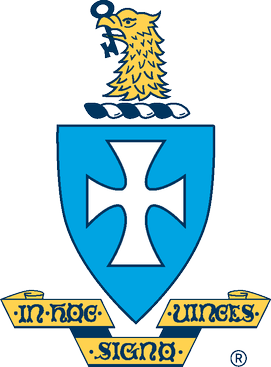
Sigma Chi (ΣΧ) International Fraternity is one of the largest of North American social fraternities. The fraternity has 244 active undergraduate chapters and 152 alumni chapters across the United States and Canada and has initiated over 350,000 members. The fraternity was founded on June 28, 1855, at Miami University in Oxford, Ohio, by members who split from the Delta Kappa Epsilon fraternity.

Phi Kappa Tau (ΦΚΤ), commonly known as Phi Tau, is a collegiate fraternity located in the United States. The fraternity was founded in 1906. As of January 2024, the fraternity has 161 chartered chapters, 81 active chapters, 7 associate chapters, and about 3,500 collegiate members. SeriousFun Children's Network, founded by Beta chapter alumnus Paul Newman, is Phi Kappa Tau's National Philanthropy. According to its Constitution, Phi Kappa Tau is one of the few social fraternities that accepts both graduate students and undergraduates.

George Bruce Cortelyou was an American cabinet secretary of the early twentieth century. He served in various capacities in the presidential administrations of Grover Cleveland, William McKinley, and Theodore Roosevelt.

Pi Kappa Phi (ΠΚΦ), commonly known as Pi Kapp(s), is an American Greek Letter secret and social fraternity. It was founded by Andrew Alexander Kroeg Jr., Lawrence Harry Mixson, and Simon Fogarty Jr. on December 10, 1904 at the College of Charleston in Charleston, South Carolina. The fraternity has 187 active chapters (168 chartered chapters and 19 associate chapters), and more than 113,000 initiated members.

Phi Sigma Kappa (ΦΣΚ), colloquially known as Phi Sig or PSK, is a men's social and academic fraternity with approximately 74 active chapters and provisional chapters in North America. Most of its first two dozen chapters were granted to schools in New England, New York and Pennsylvania; therefore its early development was strongly Eastern in character, eventually operating chapters at six of the eight Ivy League schools as well as more egalitarian state schools. It later expanded to the South and West.
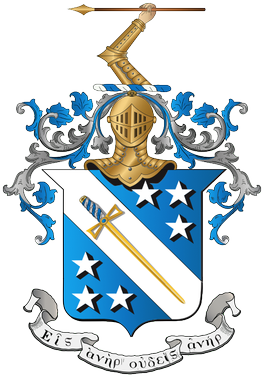
Phi Delta Theta (ΦΔΘ), commonly known as Phi Delt, is an international secret and social fraternity founded at Miami University in 1848 and headquartered in Oxford, Ohio. Phi Delta Theta, along with Beta Theta Pi and Sigma Chi form the Miami Triad. The fraternity has over 190 active chapters and colonies in over 43 U.S. states and five Canadian provinces and has initiated more than 277,000 men between 1848 and 2021. There are over 160,000 living alumni. Phi Delta Theta chartered house corporations own more than 135 houses valued at over $141 million as of summer 2015. There are nearly 100 recognized alumni clubs across the U.S. and Canada.
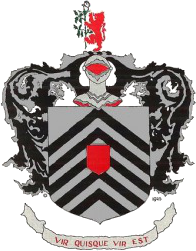
Theta Kappa Nu (ΘΚΝ) Fraternity was an American national collegiate fraternity founded in 1924 by delegates from eleven local fraternities. It merged with Lambda Chi Alpha in 1939.
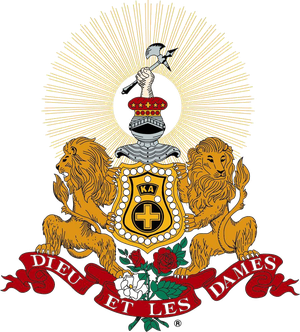
Kappa Alpha Order (ΚΑ), commonly known as Kappa Alpha or simply KA, is a social fraternity and a fraternal order founded in 1865 at Washington and Lee University in Lexington, Virginia. As of December 2015, the Kappa Alpha Order lists 133 active chapters, five provisional chapters, and 52 suspended chapters. Along with Alpha Tau Omega and Sigma Nu, the order constitutes the Lexington Triad. Since its establishment in 1865, the Order has initiated more than 150,000 members.

Phi Sigma Epsilon (ΦΣΕ) was a North American social fraternity that operated for 75 years until its merger with the Phi Sigma Kappa (ΦΣΚ) fraternity. In 1985, the majority of Phi Sigma Epsilon chapters participated in the merger. Phi Sigma Kappa incorporated many of the symbols of Phi Sigma Epsilon into its own, changing its crest, and expanding its Cardinal Principals, symbolism, rituals, and historical canon to embrace the milestones of Phi Sigma Epsilon's development. These changes were soon fully adopted by all chapters of the fraternity which retained the name Phi Sigma Kappa.

Phi Kappa National Fraternity (ΦΚ) is a secondary school social fraternity. Since its founding in the early twentieth century, Phi Kappa has chartered nearly fifty chapters in eight states in the Deep South. No chapters of the fraternity have ever been chartered outside of the South. Phi Kappa is the oldest and largest exclusively Southern Greek-letter social fraternity.
Nathan Robert Barragar was an American collegiate and professional football player.
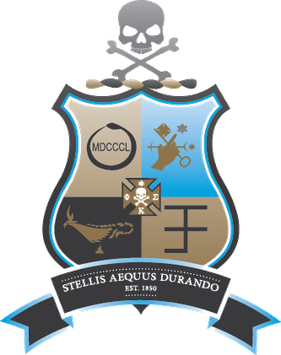
Phi Kappa Sigma (ΦΚΣ), also known as Phi Kap, Skulls, or Skullhouse, is an international all-male college secret society and social fraternity. Commonly known as “Skulls”, the name is inspired by the skull and crossbones on the fraternity's badge and coat of arms. Members are often recognized by the solid gold membership pin depicting the fraternity’s symbol, a Maltese Cross surrounding a human skull. The fraternity is one of the world’s oldest and most successful social fraternities, developing generations of leaders in politics, law, business, professional sports, and military service. From 1886 through 1980, there was at least one Skull serving in the United States Senate. The 94-year history of Skull’s involvement in the upper chamber was broken when Richard Schweiker retired from the Senate to serve as Secretary of Health and Human Services under the administration of President Ronald Reagan.

Frederick Delbert Schwengel was a Republican U.S. Representative from southeastern Iowa.

George Walter Freese was an American third baseman in Major League Baseball. He played for the Detroit Tigers in 1953, Pittsburgh Pirates in 1955 and Chicago Cubs in 1961. Freese attended West Virginia University, where he played college baseball for the Mountaineers in 1947. While at West Virginia he was a member of Phi Sigma Kappa fraternity.
The North American fraternity and sorority system began with students who wanted to meet secretly, usually for discussions and debates not thought appropriate by the faculty of their schools. Today they are used as social, professional, and honorary groups that promote varied combinations of community service, leadership, and academic achievement.
Jim Anderson is an American retired college basketball coach. He served as head men's basketball coach at Oregon State University from 1989 to 1995, compiling a record of 79–90. Anderson attended Oregon State as an undergrad, playing on teams that won three Far West Classic titles and a Pacific Coast Conference championship in 1958. In his senior season he was named to the Classic's all-tournament team. While at OSU he was a member of Phi Sigma Kappa fraternity. He graduated in 1959.
Orlin Woodrow Rogers, nicknamed "Buck" or "Lefty", was a Major League Baseball pitcher who played for the Washington Senators in 1935. He attended college at Virginia where he was a member of Phi Sigma Kappa fraternity.

Joseph Francis Barrett (1854–1918) was an American agricultural supply company executive who was a long-time alumnus leader of Phi Sigma Kappa fraternity, which he co-founded with five others in 1873.
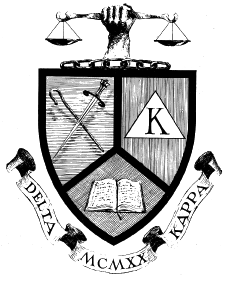
Delta Kappa Fraternity (ΔΚ) was an American national fraternity that existed from 1920 to 1964. It survives today with two local chapters in New York state.
References
- ↑ Bill Smith, Alabama '57 (May 1955). Earl F. Schoening (ed.). "Bang-up Celebration for Alabama Phi Sigs". The Signet, A Magazine for Members of Phi Sigma Kappa Fraternity: Vol. LXVII, No. 32, pg. 161.
{{cite journal}}: CS1 maint: numeric names: authors list (link) - ↑ A variant of his last name appears to have been used in college, or it was a typo, inserting an "e" as "Espey." This was the form used in the Signet article and in his member record; he is the same individual.
- ↑ Solotaroff, Ivan. "The Death Belt: Florida to Texas". The Last Face You'll Ever See: The Private Life of the American Death Penalty – via 20SomethingReads.